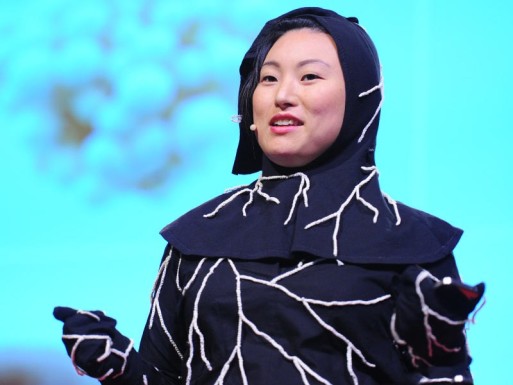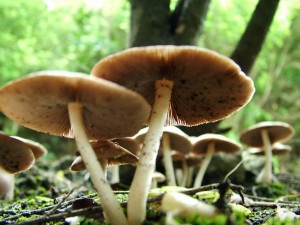
Jae Rhim Lee wearing her prototype mushroom suit
(Credit: TED.com)
A New York-based company, Coeio, is experimenting with a new concept in green burials — mushrooms — or more specifically, a “mushroom suit.” According to company cofounders Jae Rhim Lee and Michael Ma, the suit and other burial products Coeio has in development will help revolutionize the funeral industry in more ways than one.
The concept of using mushrooms in burial products was developed by Jae Rhim, (or JR, as she is often called) an MIT alumnus whose graduate work focused on the “relationships between the mind/body/self and the natural environment.” After grad school, JR studied mycoremediation — the process by which certain types of fungi break down plant material and remove contaminants from soil. At the same time, she began delving into traditional North American funeral practices and the way that they inform our collective relationship with death.
Out of these parallel fields of study came the idea for developing a unique strain of mushrooms that would hasten decomposition and remediate toxins in the body after death. JR presented the concept and a prototype of the Infinity Burial Suit at the TEDGlobal Conference in Edinburgh, Scotland in 2011. Not long after that, she was joined by Mike Ma, the head of Digital Strategy and Innovation at Bank of America, and Coeio was formed.

Credit: buzzfeed.com
Both Mike and JR were passionate about the environment and shared a mutual desire to promote greener funerals in the United States. During her research into the funeral industry, JR learned about the toxic “chemical soup” poured into the body during the embalming process, which includes not only formaldehyde, methanol and phenol, but an array of preservatives, disinfectants and dyes. At the same time, she was becoming aware of the astonishing array of toxins people carry around in their bodies while they are alive, most of which make their way into the environment after death.
The concept of using mushrooms to degrade environmental toxins is not new. Numerous studies validate the ability of many species of mushrooms to detoxify or absorb harmful chemicals, including crude oil, dyes and lead. At the Bernheim Arboretum and Research Forest near Louisville, Kentucky, workers have inoculated the soil with oyster mushrooms to remove pollutants that accummulate at the edge of a parking lot. In Mason County, Washington, burlap sacks filled with oyster and turkey tail mushrooms are being used as filters to remove pesticides, fertilizers, and even E.coli bacteria from the water supply.
Nonetheless, the idea of using mushrooms to aid in human decomposition and toxin remediation is unique.
Since 2011, JR has given up the idea of creating a new strain of mushroom in favor of using strains that currently exist. According to project manager Claire McNamara, the company is currently testing a “bio-mix made up of two different types of mushrooms and other microorganisms that together do three things; aid in decomposition, work to neutralize toxins found in the body and transfer nutrients to plant life.” Coeio hopes to have the suit available for sale in late 2016.

 A New Concept in Green Burials
A New Concept in Green Burials


 “Help Me, Helen”
“Help Me, Helen”

 “As Tears Go By” by Marianne Faithfull
“As Tears Go By” by Marianne Faithfull














